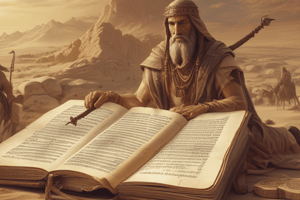Podcast
Questions and Answers
What was the primary reason for the initial defeat of the Israelites at Ai?
What was the primary reason for the initial defeat of the Israelites at Ai?
- Poor morale among the troops
- The strength of the enemy’s army
- The sin of one of the Israelites (correct)
- Joshua's lack of strategic planning
Which judge led Israel to victory over the Canaanite general Sisera?
Which judge led Israel to victory over the Canaanite general Sisera?
- Ehud
- Samson
- Gideon
- Deborah (correct)
What is the central theme depicted in the Book of Judges?
What is the central theme depicted in the Book of Judges?
- The need for constant military strength
- Faithfulness in leadership
- The establishment of a monarchy
- A cycle of sin, oppression, repentance, and deliverance (correct)
What strategy did Joshua use during the conquest of Canaan?
What strategy did Joshua use during the conquest of Canaan?
Which of the following best describes the leadership period after Joshua's death?
Which of the following best describes the leadership period after Joshua's death?
What was one significant action taken by Joshua concerning the Israelite tribes?
What was one significant action taken by Joshua concerning the Israelite tribes?
How does the Book of Joshua demonstrate God's faithfulness?
How does the Book of Joshua demonstrate God's faithfulness?
What event signifies the renewal of the covenant in the Book of Joshua?
What event signifies the renewal of the covenant in the Book of Joshua?
In the Book of Judges, how are the Israelites' moral declines primarily depicted?
In the Book of Judges, how are the Israelites' moral declines primarily depicted?
What notable characteristic defines the leadership of Judges like Gideon?
What notable characteristic defines the leadership of Judges like Gideon?
Flashcards are hidden until you start studying
Study Notes
Overview of the Book of Joshua
- Historical Context: Follows the Israelites' journey into Canaan after 40 years in the wilderness.
- Leadership: Joshua, appointed as Moses’ successor, leads the Israelites.
- Conquest of Canaan:
- Key Battles: Jericho (walls fell after marching) and Ai (initial defeat due to sin).
- Strategy: Central campaign (Jericho, Ai) followed by southern and northern campaigns.
- Division of Land:
- Canaan divided among the twelve tribes of Israel.
- Cities of refuge established for those who accidentally kill.
Themes in the Book of Joshua
- Faith and Obedience: Importance of obeying God’s commands.
- God's Faithfulness: Fulfillment of the promise made to Abraham, Isaac, and Jacob.
- Covenant Renewal: Joshua renews the covenant at Shechem.
Overview of the Book of Judges
- Historical Context: Follows the death of Joshua; covers approximately 350 years.
- Leadership: Period of tribal leaders (Judges) who led Israel before the monarchy.
- Cyclical Pattern:
- Sin: Israelites turn away from God.
- Oppression: God allows them to be oppressed by enemies.
- Repentance: Israelites cry out for help.
- Deliverance: God raises a judge (e.g., Deborah, Gideon, Samson) to save them.
- Major Judges:
- Deborah: Female judge; led Israel to victory over Canaanite general Sisera.
- Gideon: Reduces army to 300 to defeat Midianites; tests God's will.
- Samson: Known for strength; struggles with personal moral failures.
Themes in the Book of Judges
- Cycle of Apostasy: Repeated pattern of sin, judgment, and deliverance.
- Need for Leadership: Absence of a centralized authority leads to moral decline.
- God’s Mercy: Despite disobedience, God continues to raise deliverers.
Conclusion
- Transition: Joshua sets the stage for the conquest, while Judges depicts a time of struggle and the need for strong leadership.
- Importance: Both books highlight the themes of faith, obedience, and God’s enduring covenant with Israel.
Overview of the Book of Joshua
- Historical context focuses on the Israelites' entry into Canaan after a 40-year wilderness journey.
- Joshua, as Moses’ appointed successor, assumes leadership over the Israelites.
- The conquest of Canaan includes notable battles:
- Jericho's walls fell after the Israelites marched around the city.
- Initial defeat at Ai stemmed from sin within the camp.
- Military strategy consisted of a central campaign targeting Jericho and Ai, followed by southern and northern campaigns.
- Land division occurs among the twelve tribes of Israel, with cities of refuge established for individuals who commit accidental killings.
Themes in the Book of Joshua
- Faith and obedience underpin Israel's successes in following God’s commands.
- God's faithfulness is demonstrated through the fulfillment of promises made to patriarchs like Abraham, Isaac, and Jacob.
- Joshua emphasizes covenant renewal at Shechem to reaffirm the commitment to God’s laws.
Overview of the Book of Judges
- The narrative occurs after Joshua’s death and spans roughly 350 years.
- Israel is led by various tribal leaders known as Judges before the establishment of a monarchy.
- A cyclical pattern emerges throughout the book:
- The Israelites fall into sin and turn away from God.
- God permits oppression by surrounding enemies.
- The people repent and call out for divine assistance.
- God raises a judge, such as Deborah, Gideon, or Samson, to deliver them.
- Major judges include:
- Deborah, a female leader who secured victory over Sisera, a Canaanite general.
- Gideon, known for reducing his army to 300 men to defeat the Midianites while testing God's will through signs.
- Samson, celebrated for his immense strength yet plagued by personal moral failures.
Themes in the Book of Judges
- The cycle of apostasy illustrates a recurring pattern of sin, divine judgment, and subsequent deliverance.
- The lack of centralized authority highlights the need for strong leadership to prevent moral decline.
- God’s mercy remains evident, as He continuously raises deliverers for the people despite their disobedience.
Conclusion
- The transition from Joshua to Judges marks a shift from conquest to a period of struggle characterized by the necessity for strong leadership.
- Both books underline significant themes of faith, obedience, and the enduring nature of God’s covenant with the nation of Israel.
Studying That Suits You
Use AI to generate personalized quizzes and flashcards to suit your learning preferences.




